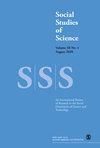A precision immuno-oncology turn? Hybridizing cancer genomics and immunotherapy through neoantigens-based adoptive cell therapies
IF 2.7
2区 社会学
Q1 HISTORY & PHILOSOPHY OF SCIENCE
引用次数: 0
Abstract
This article explores the development of T cell-based therapies in Switzerland. These therapies, which elicit the immunological potential of each patient to respond to tumor development, constitute a major promise for so-called ‘precision oncology’. We document how immunological concepts, technologies, and practices are articulated given the centrality of genomics in ‘precision oncology’. We consider ‘precision immunotherapies’ to probe whether and how change ensues in these established sociotechnical regimes of biomedicine. The case of genomics and immunology in oncology offers a unique insight into the conditions of possibility for change in such regimes. How does the present new wave of cancer immunotherapies challenge, integrate, and complement the centrality of genomics in ‘precision oncology’? What are the specific processes that make possible the convergence, competition, or co-existence of distinct conceptions, infrastructures, and programs of innovative cancer medicine? Drawing from observations and interviews with researchers and clinicians, we qualify these sociotechnical processes as hybridizations. Bringing together different sociotechnical regimes of biomedical research is conditional to the articulation of core concepts, technologies, and translational practices of genomics and immunology. Pivotal to this objective are neoantigens, cell surface proteins originating from the somatic genetic mutations of tumors and which activate a patient’s immune response. While neoantigens are an unstable entity in experimentation, they offer a conceptual and material substrate to renegotiate the dominance of cancer genomics, and initiate the production of a new, hybrid regime of ‘immunogenomic precision’ in oncology.精准免疫肿瘤学转向?杂交癌症基因组学和免疫疗法通过新抗原为基础的过继细胞疗法
这篇文章探讨了T细胞疗法在瑞士的发展。这些疗法可以激发每个患者的免疫潜能,对肿瘤的发展做出反应,这对所谓的“精确肿瘤学”来说是一个重大的承诺。我们记录了免疫学概念、技术和实践是如何在“精确肿瘤学”基因组学的中心地位下得到阐述的。我们考虑“精确免疫疗法”来探索这些已建立的生物医学社会技术制度是否以及如何发生变化。肿瘤学基因组学和免疫学的案例提供了一个独特的见解,以改变这种制度的可能性条件。当前癌症免疫疗法的新浪潮如何挑战、整合和补充基因组学在“精确肿瘤学”中的中心地位?创新癌症医学的不同概念、基础设施和项目的融合、竞争或共存的具体过程是什么?根据对研究人员和临床医生的观察和访谈,我们将这些社会技术过程定性为杂交。汇集生物医学研究的不同社会技术制度是有条件的核心概念,技术,以及基因组学和免疫学的转化实践的衔接。实现这一目标的关键是新抗原,即源自肿瘤体细胞基因突变的细胞表面蛋白,它能激活患者的免疫反应。虽然新抗原在实验中是一个不稳定的实体,但它们为重新协商癌症基因组学的主导地位提供了概念和物质基础,并启动了肿瘤学中“免疫基因组学精确”的新混合体制的生产。
本文章由计算机程序翻译,如有差异,请以英文原文为准。
求助全文
约1分钟内获得全文
求助全文
来源期刊

Social Studies of Science
管理科学-科学史与科学哲学
CiteScore
5.70
自引率
6.70%
发文量
45
审稿时长
>12 weeks
期刊介绍:
Social Studies of Science is an international peer reviewed journal that encourages submissions of original research on science, technology and medicine. The journal is multidisciplinary, publishing work from a range of fields including: political science, sociology, economics, history, philosophy, psychology social anthropology, legal and educational disciplines. This journal is a member of the Committee on Publication Ethics (COPE)
 求助内容:
求助内容: 应助结果提醒方式:
应助结果提醒方式:


